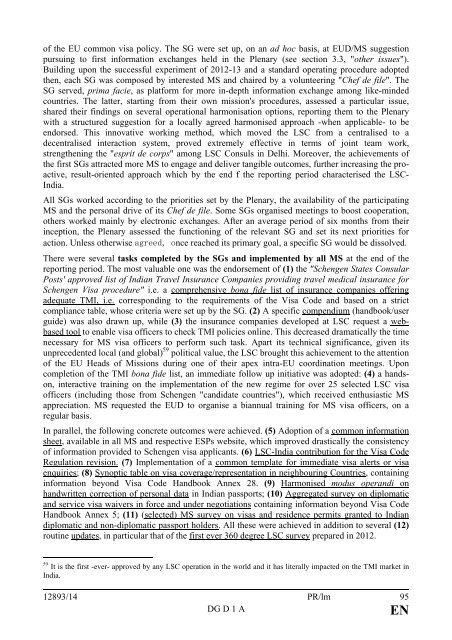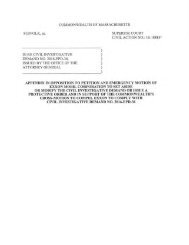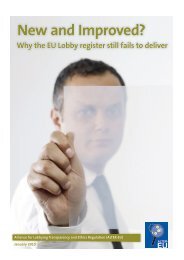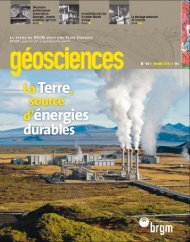eu-com-schengen-coop
eu-com-schengen-coop
eu-com-schengen-coop
Create successful ePaper yourself
Turn your PDF publications into a flip-book with our unique Google optimized e-Paper software.
of the EU <strong>com</strong>mon visa policy. The SG were set up, on an ad hoc basis, at EUD/MS suggestion<br />
pursuing to first information exchanges held in the Plenary (see section 3.3, "other issues").<br />
Building upon the successful experiment of 2012-13 and a standard operating procedure adopted<br />
then, each SG was <strong>com</strong>posed by interested MS and chaired by a volunteering "Chef de file". The<br />
SG served, prima facie, as platform for more in-depth information exchange among like-minded<br />
countries. The latter, starting from their own mission's procedures, assessed a particular issue,<br />
shared their findings on several operational harmonisation options, reporting them to the Plenary<br />
with a structured suggestion for a locally agreed harmonised approach -when applicable- to be<br />
endorsed. This innovative working method, which moved the LSC from a centralised to a<br />
decentralised interaction system, proved extremely effective in terms of joint team work,<br />
strengthening the "esprit de corps" among LSC Consuls in Delhi. Moreover, the achievements of<br />
the first SGs attracted more MS to engage and deliver tangible out<strong>com</strong>es, further increasing the proactive,<br />
result-oriented approach which by the end f the reporting period characterised the LSC-<br />
India.<br />
All SGs worked according to the priorities set by the Plenary, the availability of the participating<br />
MS and the personal drive of its Chef de file. Some SGs organised meetings to boost <strong>coop</strong>eration,<br />
others worked mainly by electronic exchanges. After an average period of six months from their<br />
inception, the Plenary assessed the functioning of the relevant SG and set its next priorities for<br />
action. Unless otherwise agreed, once reached its primary goal, a specific SG would be dissolved.<br />
There were several tasks <strong>com</strong>pleted by the SGs and implemented by all MS at the end of the<br />
reporting period. The most valuable one was the endorsement of (1) the "Schengen States Consular<br />
Posts' approved list of Indian Travel Insurance Companies providing travel medical insurance for<br />
Schengen Visa procedure" i.e. a <strong>com</strong>prehensive bona fide list of insurance <strong>com</strong>panies offering<br />
adequate TMI, i.e. corresponding to the requirements of the Visa Code and based on a strict<br />
<strong>com</strong>pliance table, whose criteria were set up by the SG. (2) A specific <strong>com</strong>pendium (handbook/user<br />
guide) was also drawn up, while (3) the insurance <strong>com</strong>panies developed at LSC request a webbased<br />
tool to enable visa officers to check TMI policies online. This decreased dramatically the time<br />
necessary for MS visa officers to perform such task. Apart its technical significance, given its<br />
unprecedented local (and global) 59 political value, the LSC brought this achievement to the attention<br />
of the EU Heads of Missions during one of their apex intra-EU coordination meetings. Upon<br />
<strong>com</strong>pletion of the TMI bona fide list, an immediate follow up initiative was adopted: (4) a handson,<br />
interactive training on the implementation of the new regime for over 25 selected LSC visa<br />
officers (including those from Schengen "candidate countries"), which received enthusiastic MS<br />
appreciation. MS requested the EUD to organise a biannual training for MS visa officers, on a<br />
regular basis.<br />
In parallel, the following concrete out<strong>com</strong>es were achieved. (5) Adoption of a <strong>com</strong>mon information<br />
sheet, available in all MS and respective ESPs website, which improved drastically the consistency<br />
of information provided to Schengen visa applicants. (6) LSC-India contribution for the Visa Code<br />
Regulation revision. (7) Implementation of a <strong>com</strong>mon template for immediate visa alerts or visa<br />
enquiries; (8) Synoptic table on visa coverage/representation in neighbouring Countries, containing<br />
information beyond Visa Code Handbook Annex 28. (9) Harmonised modus operandi on<br />
handwritten correction of personal data in Indian passports; (10) Aggregated survey on diplomatic<br />
and service visa waivers in force and under negotiations containing information beyond Visa Code<br />
Handbook Annex 5; (11) (selected) MS survey on visas and residence permits granted to Indian<br />
diplomatic and non-diplomatic passport holders. All these were achieved in addition to several (12)<br />
routine updates, in particular that of the first ever 360 degree LSC survey prepared in 2012.<br />
59<br />
It is the first -ever- approved by any LSC operation in the world and it has literally impacted on the TMI market in<br />
India.<br />
12893/14 PR/lm 95<br />
DG D 1 A<br />
EN












